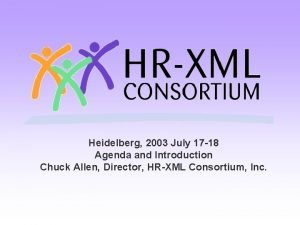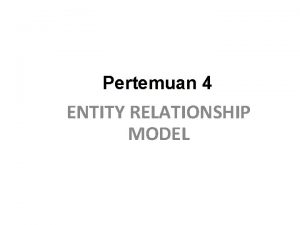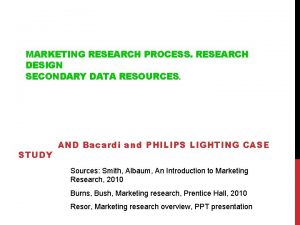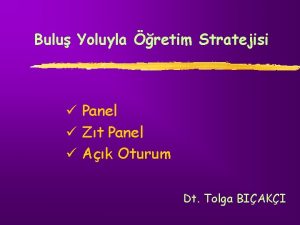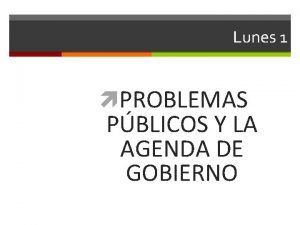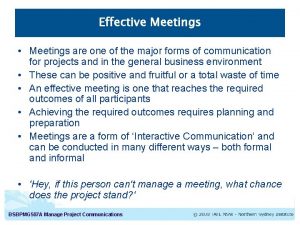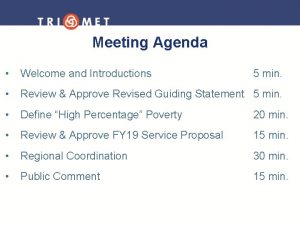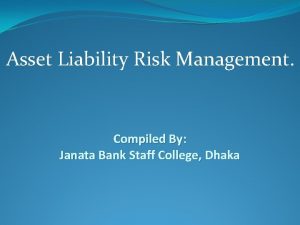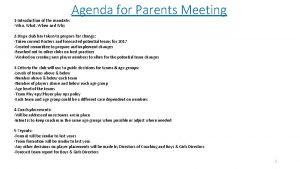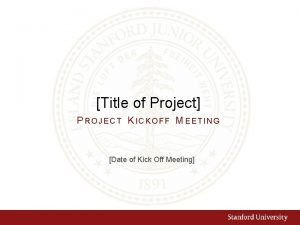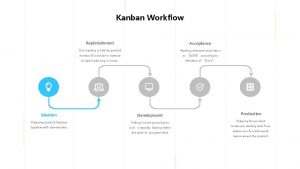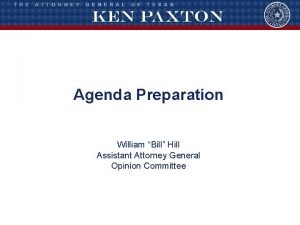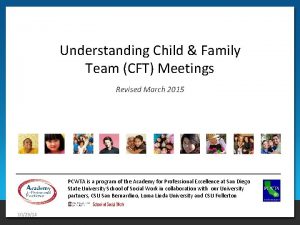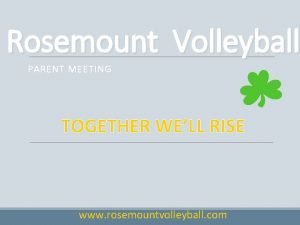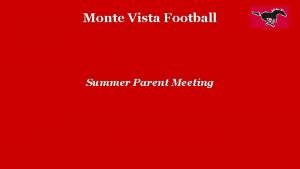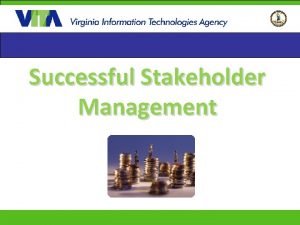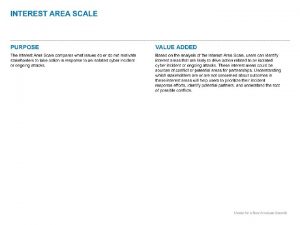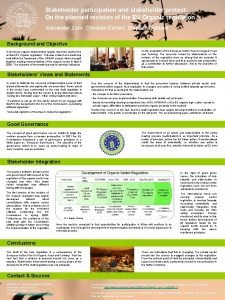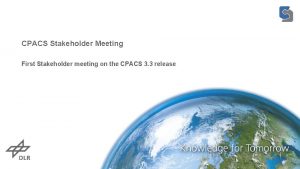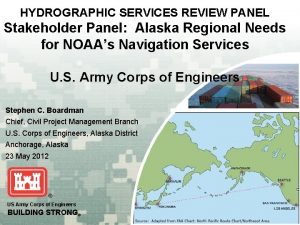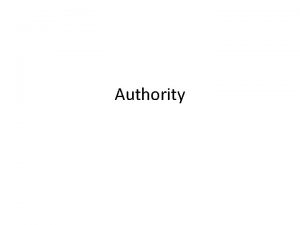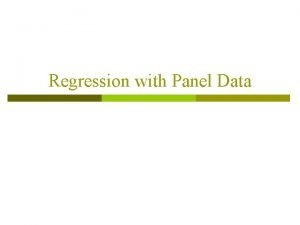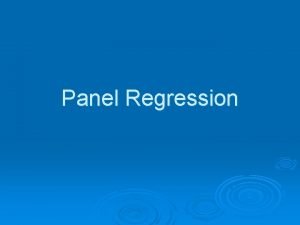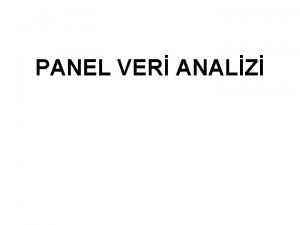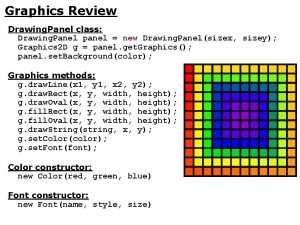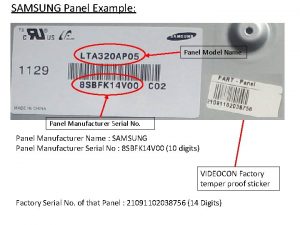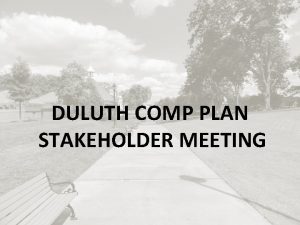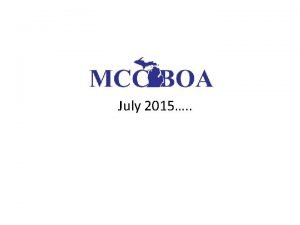Meeting Agenda Stakeholder Participation Panel July 14 2003


















- Slides: 18

Meeting Agenda Stakeholder Participation Panel July 14, 2003 • Welcome/Introductions • Study Overview • Tasks/Products/Schedule • Traffic Patterns • Break • Key Project Elements • Goals/Objectives/Performance Measures • Next Steps • Adjourn

Study Overview Purpose • Develop transportation alternatives that eliminate or minimize the adverse impacts of increased traffic volumes on the Chickamauga Battlefield unit of Chickamauga-Chattanooga National Military Park (CCNMP) and the surrounding communities. • Provide information and strategies to assist National Park Service (NPS), Georgia Department of Transportation (GDOT), and the surrounding communities in responding to anticipated future growth.

Traffic Impact Study Area • Portions of Walker and Catoosa Counties surrounding the Park Approach • Review existing and future transportation needs and identify short term and long term solutions • Primary focus - evaluate impact of recently completed US 27 relocation on traffic volumes and congestion • Seek input from the public, local governments, and businesses: ― Issues, Improvements, Mitigation • Address environmental justice considerations

Subarea Transportation Plan Study Area • Chickamauga Battlefield unit of the Chickamauga and Chattanooga National Military Park Approach • Address unique features of the Park and its role as an important local, and national cultural and historic resource • Develop evaluation measures and thresholds that are appropriate to the Park Setting (resource protection and visitor experience)

Study Schedule Timing March-July 2003 July 14 2003 Activities Study initiation, Work Plan Finalization, Public Involvement Plan, Data Collection, Public Outreach (Newsletter, Website, stakeholder database) Stakeholder Participation Panel (SPP) & Public/General Stakeholder Meetings (input on issues, needs, desired future conditions, goals, objectives) July 15 2003 Project Coordinating Committee (PCC) Meeting Late July – early August 2003 August-Sept 2003 Roadside survey distribution (information on travel patterns) Refinement of travel demand model and preparation of future travel volume projections Mid Sept 2003 Identification of Issues/Needs SPP workshop/PCC meeting (evaluation measures and thresholds for Park)

Study Schedule (continued) Timing Activities Mid October 2003 Newsletter 2/Website update Late October 2003 Deliverable: Issues, needs, evaluation of transportation system, air quality Identify potential alternatives to address deficiencies and needs Early Dec 2003 Late Jan 2004 Mid Feb 2004 Mid Mar 2004 Late Apr 2004 Review alternatives against established evaluation criteria and thresholds PCC, SPP and public meetings to review and comment Develop set of feasible alternatives, impacts and measures SPP meeting & PCC meeting to review and comment Deliverable: Recommended alternatives Newsletter 3/Website update Prepare draft report Public meeting - present recommendations Prepare final report Newsletter 4/Website update – present final recommendations

Study Products Traffic Impact Study • Program of transportation improvements in a format suitable for consideration in Chattanooga Hamilton MPO transportation planning process Subarea Transportation Plan • Set of viable transportation alternatives that reflect unique needs of the Park and preserve its role as an important local and national cultural and historic resource • Recommendations will be considered by NPS in preparation of Park’s new General Management Plan

Traffic Patterns • Data Collection Methodology • License Tag Survey Traffic Patterns • Weekday Traffic Patterns • Before/After Patterns - US 27 Relocation • Roadside Survey • Future “As Is” Travel Demand Model Volumes • Future Travel Demand Model Refinements

Key Project Elements Major Issue Areas • Transportation & mobility • Resource preservation • Economic development • Recreation

Transportation & Mobility Issues • Conflicts between commuter and recreational traffic • Conflicts between vehicular and nonvehicular travel • Efficiency of non-recreational trips • Quality of experience for tourists and recreational travelers • Roadway function and level of service standards • Appropriate Speed • Number and severity of crashes • Potential cost of improvements

Resource Preservation Issues • Historical resources • Natural resources • Quality of life in study area • Relationship to economic development • Visitor transportation and recreational needs

Economic Development Issues • Implications of projected growth − On transportation system − On historic and natural resources • Relationship to preservation goals • Balance between tourism and other forms of economic development • Transportation actions and policies to enhance visitor experience • Compatibility with policies of local communities

Recreation Issues • Balance between different uses of Park − Commemoration − Education − Local recreation • Bicycle/pedestrian considerations − Routes within Park − Connections to Park − Regional system issues • Enhancing Park visitor experience with other opportunities in region

Goals, Objectives & Performance Measures Traffic Impact Study – 1 A Goal • To ensure that the transportation system meets the mobility needs of the community and region. Objectives • To provide a safe transportation system. • To promote the development of alternative modes and connections between modes. • To improve north-south connectivity east of the Chickamauga Park area. Performance • Traffic Volumes • Level of Service Measures • Accident rates

Goals, Objectives & Performance Measures, Cont. Traffic Impact Study – 1 B Goal • To increase the attraction of the US Highway 27 relocation for commuters (motorists not destined to the Park). Objectives • To ensure that non Park traffic uses other alternatives. • To ensure that the community transportation system can accommodate existing and future needs and provide easy access to the US Highway 27 Relocation. Performance • Traffic Volumes • Level of Service Measures • Percent Split (% local and through traffic)

Goals, Objectives & Performance Measures, Cont. Subarea Transportation Plan – 2 A Goal • To minimize adverse impacts of traffic and transportation usage on the Chickamauga Battlefield Unit of the Chickamauga and Chattanooga National Military Park and its resources. Objectives • To reduce non-park vehicular traffic volume on park roadways. • To provide adequate and safe transportation facilities for Park users on Park property. • To provide an exceptional visitor experience. Performance • Traffic Volumes • Percent Split (% local and through traffic) Measures • Accident Rate • Level of Service • Parking Utilization • Visitor Feedback

Goals, Objectives & Performance Measures, Cont. Subarea Transportation Plan – 2 B Goal • To develop feasible transportation strategies that will respond to anticipated future growth in the area and in the Park. Objectives • To identify transportation alternatives that reflect the unique needs of the Park in preserving its role as a historic resource. • To identify what local communities can do with land use development to complement and protect the Park (minimize impacts of traffic on the Park). Performance • Traffic Volumes • Number of Tourists Measures • Economic Value/Tourism • Feasible and implementation recommendations

Next Steps • Late July/Early August: Roadside Survey • Aug-Sept: Refinement of Travel Demand Model and Preparation of Future Travel Projections • Mid-Sept: SPP Workshop – Evaluation Measures and Thresholds for Park • Late Oct: Newsletter/Website Update/Deliverable – Issues and Needs; Transportation System Evaluation
 2003 july 17
2003 july 17 Total participation constraint adalah
Total participation constraint adalah Continuous panel vs discontinuous panel
Continuous panel vs discontinuous panel Zıt panel
Zıt panel Agenda sistemica y agenda institucional
Agenda sistemica y agenda institucional Steering committee meeting agenda sample
Steering committee meeting agenda sample Meeting agenda welcome and introductions
Meeting agenda welcome and introductions Agenda welcome and introductions
Agenda welcome and introductions Alco meeting agenda
Alco meeting agenda Agenda for parents meeting
Agenda for parents meeting Meeting agenda visio
Meeting agenda visio Replenishment meeting
Replenishment meeting Accounting meeting agenda
Accounting meeting agenda What is a cft
What is a cft Football parent meeting agenda
Football parent meeting agenda How to prepare agenda for meeting
How to prepare agenda for meeting Volleyball parent meeting agenda
Volleyball parent meeting agenda Football parent meeting agenda
Football parent meeting agenda Distributor meeting agenda
Distributor meeting agenda
